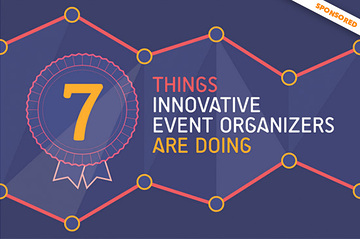This is a sponsored post written by Alon Alroy, Co-Founder, CMO & BizDev of Bizzabo. More information about Event Manager Blog’s sponsored posts.
When it comes to the world of professional events – from well-established legacy conferences to cutting-edge corporate retreats, the industry is ripe for change as well as a technological revolution. Though the industry is well on its way to embracing a more tech savvy, dynamic future there are quite a few stragglers left in the (event) dust. So what are the forward-thinking event planners out there actually doing? Are you keeping your event practices up to snuff?
Personalizing Digital Marketing
Chances are you’re not just used to having brands speak and serve you on a personal level – you expect it. Whether it’s that suggested Spotify playlist based on your music preferences, or the Expedia emails about discounted flights from your home city – we are living in a personalized world and you are a personalized event organizer.
So how does this pertain to you? First off, implementing personalization in your email marketing campaigns can have a great impact on your bottom line – whether it is hitting your ticket sales or registration goals. Segmenting your content by type of attendee (are they past attendees? are they speakers?) will increase conversion rates. By incorporating your attendees’ name in your subject line and signing off with your own name you can easily humanize your message and have a more direct appeal to attendees. Your online ads can be personalized to target visitors of your event website through retargeting campaigns. How cool would it be if a potential attendee would be greeted with “Welcome back ” when they visit your website on the 2nd time. Regardless of cool, it will increase the chances of them registering. Successful organizers personalize their digital marketing to attract the right audience and lead them to take the next action faster.
Simplifying Metrics
As an event organizer you are no stranger to data. Your planning budget, registration revenue, attendee reports and engagement analytics are just a few metrics that are no doubt constantly bouncing around in your head and across spreadsheets on spreadsheets. While there are a multitude of tools collecting data, it’s not the data itself that is useful, but the insights drawn from them. Successful organizers don’t just collect the data – they draw out the key figures and understand how to use this knowledge to move forward making smarter planning decisions. They make it possible by using an event management software that integrates their event vitals, such as registration, email campaigns, social media, event app, engagement tools etc.). By doing so, they can easily see a clean, clear dashboard of the big picture of their data.
Looking Beyond Demographics
It may seem like going against common sense to look past the popular demographic designations of “Millennial”, “Gen X”, and “Baby Boomers”, but studies have shown that segmenting audiences by generations just isn’t cutting it. People across all demographics are preferring “authenticity” and “humanity” when dealing with brands – they want to be spoken to like an actual person and don’t just want to be sold to like a number on a paper. Instead, organizers should look at the motivation an attendee has to go to an event. What purpose does this event experience have on their lives and careers? Grouping attendees by their motivation and attitude towards your event rather than demographics, as well as incorporating personalization (mentioned above!) can help you keep your content relevant and better target your audience.
Being “Responsive”
While it is an absolute must to have quick response time to your attendees, the savvy organizers know this also means that their online content – event website, agenda, emails, speakers profiles, networking platform, must be responsive and look good on any device. Attendees may use their laptop to buy their ticket on your site, open their emails on their tablet, and follow the event agenda on their smartphone. When looking for an event management software, the innovative organizers make sure that their digital assets are responsive – on web, tablet and mobile. Most chances are that your attendees will view your event site and will interact with your marketing campaigns on mobile. The forward-thinking organizers are committed to providing a great experience, even on a small screen.
Enabling Brand Ambassadors
Unless you’ve taken residence underneath a rock you probably know that word of mouth is the most powerful marketing tool. Though word of mouth is organic and can’t be faked by wiley marketers, you should definitely be implementing a sort of social referral program. Much like big-name startups such as Airbnb and Uber, the innovative organizers amp up their event’s social power by incentivizing attendees to share their event with their networks. By implementing referral programs, attendees have the opportunity to offer discounts or other incentives to their colleagues while also potential getting money back from their already purchased ticket. This lets those organizers reach new audiences and and turn attendees into event ambassadors. Successful organizers identify, reward and enjoy the power of advocate marketing.
Outsourcing Event Tasks…To Technology
Remember those old sci-fi movies about robots taking over and having complete control? Who said that would be such a bad thing! Okay, so you would still ultimately be controlling these “robots”, but some technology such as drones and automated platforms are helping organizers do much more than they ever have. Drones can capture videos and images that human photographers and videographers can’t – and can even be used to take the place of live entertainers. Further, savvy event organizers are finding more and more tasks that they can easily automate. Many planners use tools that automatically update their event lists so when it comes to event day all they have to do is sign-in to their check-in interface and they already have an updated lists of attendees that they can check-in right from their tablet. So long, spreadsheets!
Getting Rid of Spreadsheets
Nothing gives you a solid migraine like a nice, complex, multi-tab spreadsheet. Though everyone can relate to this, spreadsheets have still been a necessity when it comes to the day-to-day of most planners. Now, with the release of innovative yet accessible tools, planners are finding that they can automate more and more tasks that they used to have to do manually. Event management software that uses Smart Lists can automatically update list of attendees, as well as helping you easily segment contacts who haven’t bought tickets, are returning attendees, or many other types of filters. This allows you to skip the mind-numbing tasks of manually updating spreadsheets, while also giving you the power to understand your attendees on a granular level and make their experience even more personalized.
Optimizing by Outsourcing
No doubt there has been at least one moment in the past year when you fancied having another pair of arms, or at least the ability to never sleep so you could successfully hit every event deadline. While freelancers have always been an option, it’s now easier than ever to get that extra pair of hands on-demand. Companies such as Upwork, Fiverr and Taskrabbit give you access to a marketplace of talent that you can hire for as little as $5. This means things that were originally out of reach due to lack of budget or time, such as a promotional event video or frequent content for the event blog, can now easily be achieved – while also freeing you up to focus on the main tasks at hand.
In Conclusion
The innovative event organizers create personal “experiences”. They personalize their message, humanize their voice and make sure they communicate to the right audience. They use an all-in-one event management software to measure their efforts and constantly try to optimize them by reading between the lines of their data – by looking at insights instead of just numbers. Those organizers speak the language of their attendees and interact where they are – on the go. They use the power of advocate marketing and make sure they are focused on the most important tasks – they automate or outsource the rest. The most successful organizers use technology that allows them to focus on creating unforgettable experiences, instead of event management. Are you an innovative organizer?





